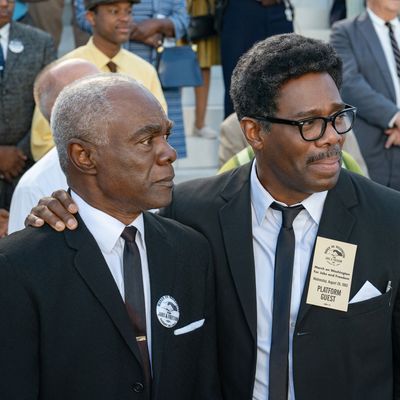
On January 23, 2024, Rustin’s Colman Domingo was nominated for an Oscar for Best Actor.
It’s surely a net good that there now exists a major biopic, produced by Netflix (with some help from Barack and Michelle Obama), about the life of Bayard Rustin, a key force in the Civil Rights movement who rarely got the exposure afforded many other figures of the era. A gay man and a former Communist, Rustin generally remained behind the scenes, using his formidable organizing skills to put together major events like the 1963 March on Washington and to keep his good friend Martin Luther King Jr. on message. Yet, he was also a supremely talented speaker himself, one whose passion and wit often made him a convincing polemicist. (There’s a very good 2003 documentary, Brother Outsider: The Life of Bayard Rustin, about all this.)
It makes some sense, therefore, that George C. Wolfe’s Rustin, written by Julian Breece and Dustin Lance Black, itself remains grounded in the backroom dealings that became Rustin’s primary field of operation. The film spends much of its time depicting the contentious back-and-forth and infighting around organizing the March on Washington, one that saw Rustin at odds with many notable Black leaders, including NAACP chief Roy Wilkins (Chris Rock) and Representative Adam Clayton Powell (Jeffrey Wright).
It’s a lot of talk, in other words, and a lot of ham-handed stage-setting with lines like, “You are a man of exceptional skills and of keen intellect, but until you admit your anger at being abandoned by your parents, which is why you became homosexual, to hurt them and yourself, you will never be fully whole, do you hear me?” Or exchanges like, “Norm, Tom, meet the indomitable Cleve Robinson, union leader of District 65 and newly appointed chairman of the march’s administrative committee.” This is classroom-exercise level writing.
Luckily, the film has Colman Domingo in the title role, and the actor plays Bayard Rustin as a force that couldn’t really be contained within these little rooms. He is theatrical, loud, resolute, the kind of person that would probably be supremely frustrating if you ever wound up on the other side of an argument from him, but who is clearly animated by an overwhelming sense that he is on the right side of history. That makes for a purposeful disconnect, perhaps, with the more solemn performances being given around him. Domingo’s Rustin belongs in a different movie than everybody else — including Aml Ameen’s solemn, conflicted turn as Martin Luther King Jr. — but that’s the point. Even as we see him accomplish great tasks, we feel for the untapped potential of his persona.
Where Rustin falters is in the aforementioned, awkward, all-too-expository writing. Even though the film doesn’t take on a wide swath of the character’s life like other biopics, it’s still filled with all the clichés of the genre. The glimpses of his personal affairs feel pro forma. We see Bayard’s relationship with a fellow activist (Gus Halper) and his burgeoning love affair with a young, married minister (Johnny Ramey) whom he introduces to a world hidden in the shadows of respectability. There’s promise here, but again, the script largely fails us, delivering predictable, programmed plot points about homophobia and the closet — accurate, surely, but also quite dull. The largely methodical direction from Wolfe doesn’t help much either; the filmmaker’s theatrical background serves him well with actors but often leads to visual inertia. All in all, one walks away from Rustin enchanted with Domingo’s performance, while feeling that a character as larger than life and momentous as Bayard Rustin surely deserves a film less dutiful and more inspired.


